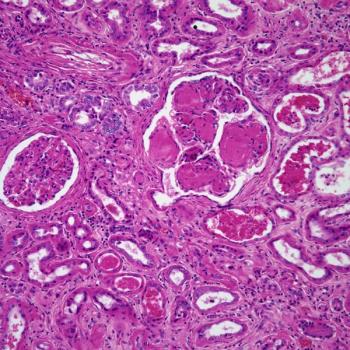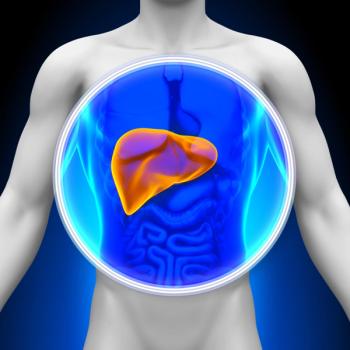
While the majority of patients with breast cancer are women, men need to be considered when designing clinical trials.

Your AI-Trained Oncology Knowledge Connection!


While the majority of patients with breast cancer are women, men need to be considered when designing clinical trials.

Findings suggest that sensitive circulating tumor DNA analysis may be a valuable tool for guiding neoadjuvant treatment decision-making in early-stage triple-negative breast cancer.

Data from a study highlight that the breast cancer makes up the highest number of early-onset disease cases compared with other cancer types from 2010 to 2019, although overall cancer morality appears to have decreased.

Paolo Tarantino, MD, discusses how drug prices within the United States are affecting the treatment of breast cancer.

Patients receiving ibrutinib plus venetoclax for chronic lymphocytic leukemia appear to experience improved overall survival at 46 months compared with those receiving chlorambucil plus obinutuzumab in the phase 3 GLOW study.

Complete responses in patients with pretreated relapsed/refractory mantle cell lymphoma treated with glofitamab appear to be early and enduring.

In this September edition of Snap Recap, we share our highlights from Prostate Cancer Awareness Month, news in the breast cancer space, and the latest FDA updates.

Members of the committee reviewed findings from the phase 3 CodeBreaK200 trial, assessing the benefit of sotorasib in KRAS G12C–mutant non–small cell lung cancer.

Combining pembrolizumab with enfortumab vedotin-ejfv significantly improves responses vs chemotherapy among patients with previously untreated locally advanced or metastatic urothelial carcinoma.

Data from the phase 2 SGNTUC-019 study support HER2 as an actionable biomarker in patients with metastatic biliary tract cancer.

Findings from a meta-analysis support the feasibility of administering hysteroscopic surgery plus progesterone to patients of childbearing age with various types of endometrial cancer.

Investigators will present overall survival and objective response data from the phase 3 MARIPOSA-2 trial assessing amivantamab in EGFR exon 19 deletion–positive non–small cell lung cancer at a future scientific meeting.

Diagnostic CT-enabled radiation therapy also reduces patient-reported time burden in the palliative setting.

Two phase 2 studies are assessing the efficacy of BDC-1001 in several disease states, including colorectal, gastroesophageal, endometrial, and breast cancer.

Investigators are assessing AVB-001 as a treatment for those with high-grade serous adenocarcinoma of the ovary, primary peritoneum, or fallopian tube in a phase 1/2 trial.

Data from a phase 1 trial highlight a clinically acceptable safety profile for BI 764532 in patients with extensive-stage small cell lung cancer and extrapulmonary neuroendocrine carcinomas.

Patients with paroxysmal nocturnal hemoglobinuria can now self-administer pegcetacoplan subcutaneously following the FDA’s approval of an injector.

The marketing authorization application for imetelstat in lower-risk myelodysplastic syndrome is based on findings from the phase 3 IMerge trial.

Alisertib will be assessed in patients with small cell lung cancer as part of the phase 2 Study PUMA-ALI-4201.

Data from the FABREC trial support the use of hypofractionated postmastectomy radiotherapy in patients with breast cancer following implant-based reconstruction.

Data suggest a role for TIGIT blockade or CD25-positive cell depletion to enhance teclistamab’s efficacy in relapsed/refractory multiple myeloma.

Investigators of a phase 1a trial report high objective response rates in patients receiving forimtamig for relapsed/refractory multiple myeloma, including those with high-risk cytogenetics and extra medullary disease.

Most adverse effects appear to be grade 1 or 2 among patients with hepatocellular carcinoma and other solid tumors associated with the MYC oncogene receiving OTX-2002 in the phase 1/2 MYCHELANGELO I trial.

Arvind N. Dasari, MD, and Cathy Eng, MD, discuss clinical trial data that may support the FDA approval of fruquintinib in metastatic colorectal cancer, and how it may impact the standard of care.

BCMA and GPRC5D loss in patients with multiple myeloma may lead to resistance to continuous treatment with anti–BCMA and anti–GPRC5D agents.

Pomalidomide plus bortezomib and dexamethasone confers a larger progression-free survival benefit than bortezombib plus dexamethasone among patients with relapsed/refractory multiple myeloma in the phase 3 OPTIMISMM trial.

The biologic license application for odronextamab in relapsed/refractory follicular lymphoma or diffuse large B-cell lymphoma is based on data from the phase 1 ELM- 1 and phase 2 ELM-2 studies.

Neeraj Agarwal, MD, states that he is optimistic about the development of new treatment options including immunotherapies, CAR T-cell therapies, and antibody-drug conjugates for metastatic prostate cancer.

Treatment with BI 764532 produces a manageable safety profile among those with small cell lung cancer and neuroendocrine carcinoma in a phase 1 trial.

APOBEC mutational activity appears to be prognostic in patients with newly diagnosed multiple myeloma or precursor diseases who receive daratumumab quadruplets, according to Kylee Maclachlan, MBChB, PhD.